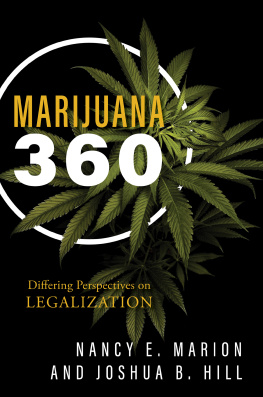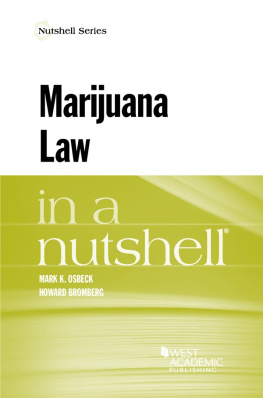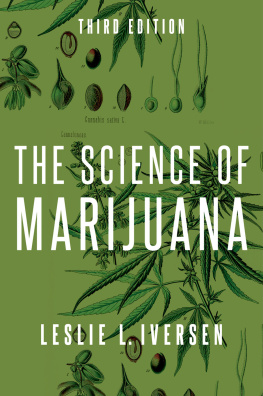Marijuana 360
Marijuana 360
Differing Perspectives on Legalization
Nancy E. Marion and Joshua B. Hill
Rowman & Littlefield
Lanham Boulder New York London
Published by Rowman & Littlefield
A wholly owned subsidiary of The Rowman & Littlefield Publishing Group, Inc.
4501 Forbes Boulevard, Suite 200, Lanham, Maryland 20706
www.rowman.com
6 Tinworth Street, London SE11 5AL, United Kingdom
Copyright 2019 by The Rowman & Littlefield Publishing Group, Inc.
All rights reserved . No part of this book may be reproduced in any form or by any electronic or mechanical means, including information storage and retrieval systems, without written permission from the publisher, except by a reviewer who may quote passages in a review.
British Library Cataloguing in Publication Information Available
Library of Congress Cataloging-in-Publication Data
Names: Marion, Nancy E., author. | Hill, Joshua B., author.
Title: Marijuana 360 : differing perspectives on legalization / Nancy E. Marion and Joshua B. Hill.
Description: Lanham, Maryland : Rowman & Littlefield, 2019. | Includes bibliographical references and index.
Identifiers: LCCN 2018047692 (print) | LCCN 2018048082 (ebook) | ISBN 9781442281660 (electronic) | ISBN 9781442281653 (cloth : alk. paper)
Subjects: LCSH: MarijuanaLaw and legislationUnited States. | Drug LegalizationUnited States.
Classification: LCC KF3891.M2 (ebook) | LCC KF3891.M2 M35 2019 (print) | DDC 345.73/0277dc23
LC record available at https://lccn.loc.gov/2018047692
 The paper used in this publication meets the minimum requirements of American National Standard for Information SciencesPermanence of Paper for Printed Library Materials, ANSI/NISO Z39.48-1992.
The paper used in this publication meets the minimum requirements of American National Standard for Information SciencesPermanence of Paper for Printed Library Materials, ANSI/NISO Z39.48-1992.
Printed in the United States of America
Contents
Chapter One
Public Support for Legalization
The publics attitudes toward marijuana use have changed dramatically in recent years throughout the United States. In the 1930s, many people believed that marijuana was more dangerous and more deadly than substances such as opium, morphine, and heroin. Since then, public support for marijuana legalization has turned around. More people agree that marijuana is a safe substance for use, even safer than legal substances like alcohol or tobacco. Many agree that marijuana has medical qualities that can relieve symptoms of a wide variety of ailments. Many others agree that it can be used recreationally to help people relax after a tough day or even to stimulate creativity in some individuals.
The publics perceptions of marijuana have been tracked over time. Public opinion can be thought of as the shared opinion of a collection of individuals on a common concern, or a compilation of how the general public feels about an issue. The Gallup polling organization carried out an early poll on the publics perception of marijuana legalization in 1969. The question asked was, Do you think the use of marijuana should be made legal or not? The results indicated that only 12 percent of respondents were in favor of legalization. A similar poll taken a few years later showed that the percentage of respondents supporting marijuana had increased to 28 percent. The support for legal marijuana fell during the 1980s, possibly due to President Reagans War on Drugs. The percentage of people who supported legal marijuana remained at about 25 percent through the mid-1990s but in 2000 increased significantly to 31 percent. A more recent poll taken in 2013 indicated that the public support for legislation rose dramatically to 58 percent. Table 1.1 shows the results of public opinion polls about marijuana legalization over time. More information on how Gallup carries out their polls is presented in box 1.1.
Table 1.1. Support for Marijuana Legalization
Year | Percent Supporting Legalization |
1969 | |
1973 | |
1977 | |
1985 | |
2001 | |
2005 | |
2009 | |
2013 | |
Source: Swift, A. (2016, October 19). Support for Legal Marijuana Use up to 60 percent in U.S. Gallup Research. www.gallup.com/poll/196550/support-legal-marijuana.aspx .
Textbox 1.1. How Polls Are Taken
Public opinion polls are used to identify the publics ideas and perceptions of issues, people, and events. They can be used to track patterns locally, nationally, or even internationally. Polls can be completed in person, over the phone, or by a mailed or paper survey. However the information is gathered, a poll that is carried out using scientific methods can be an accurate reflection of the publics mood. Pollsters need not question every person in a population in order to get a reliable estimate of opinions. Instead, they can interview only a small group of the entire population, analyze those responses, and generalize to the entire population. If the sample is chosen correctly, it can be a reliable measure of the entire population. It is imperative that the people questioned comprise a representative sample, meaning that all categories of people are represented in the smaller sample. The potential respondents must be randomly selected from the entire population in a process called probability sampling. For example, when it comes to telephone surveys, Gallup uses a random-digit-dialing (RDD) technique that provides them with a random list of phone numbers (cell phones and landlines). This means that the phone numbers are not chosen based on any characteristic: age, location, income, or any other attribute. The questions that are asked must also be written in such a way that the responses are not biased, allowing the respondents answers to be a true reflection of their views. Some of the more well-recognized organizations known for conducting trustworthy polls include Gallup, Pew, Rasmussen, CNN, New York Time s/CBS, Harris, and Quinnipiac University.
Polls taken by other organizations show similar trends to those found by the Gallup organization. The Pew Research Organization took an early poll on marijuana legalization in 1969, asking respondents if they believed that marijuana should be either legal or remain illegal. Their results showed that only 12 percent supported legalization (see table 1.2). Since that early poll, support for marijuana legalization has risen dramatically, peaking at 57 percent in 2016.
Table 1.2. Pew Survey: Do You Think the Use of Marijuana Should Be Made Legal?
Date | Legal | Illegal |
1969 | | |
1980 | | |
1990 | | |
2000 | | |
2006 | | |
2016 | | |
Source: Geiger, A. (2016, October 12). Support for Marijuana Legalization Continues to Rise. Pew Research Center. www.pewresearch.org/fact-tank/2016/10/12/support-for-marijuana-legalization-continues-to-rise .
Public opinion polls carried out by the AP-NORC Center for Public Affairs Research in 2016 reported that about 61 percent of Americans favored marijuana legalization. When questioned further, 24 percent of those in favor of legalization thought that marijuana should be available only with a physicians recommendation. Moreover, about 43 percent indicated that laws should place limits on the amount of marijuana that users can purchase.
Most people who support marijuana legalization do so because of the possible medical benefits of the plant. The second most prevalent reason for support pertains to the safety of marijuana as a natural drug. On the other hand, those who oppose marijuana report that they are concerned about the addictive qualities of the drug. Others report that marijuana causes harm to society in general and therefore should not be legal.
Next page










 The paper used in this publication meets the minimum requirements of American National Standard for Information SciencesPermanence of Paper for Printed Library Materials, ANSI/NISO Z39.48-1992.
The paper used in this publication meets the minimum requirements of American National Standard for Information SciencesPermanence of Paper for Printed Library Materials, ANSI/NISO Z39.48-1992.